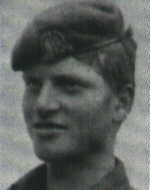Krampf, Uri (Armand)
Son of Avraham and Sima. He was born on July 17, 1950 in the city of Wroclaw, Poland, and immigrated to Israel with his family in 1957. He attended the Brenner elementary school in Kfar Saba and the ORT vocational school in Petah Tikva. He was a member of the youth movement HaNoar HaOved and in Gadna. At the vocational school, he studied frameworks as a profession, and as a hobby he worked in various engravings and woodcuts. His work excelled in beauty and delicate design. He would read a lot of his spare time and go fishing with his friends. He was a photography enthusiast and developed his own photographs. Light music and jazz were also his favorite. He took part in the four-day marches, the Galilee march, the book, and the like. He was a lively and kind boy, who had a good sense of willingness and a sincere desire to help and help others always. He was honest, pursuing justice and always striving forward. So he did not want to adjust to the routine of long stay in one place. During the Six-Day War, he actively participated in securing Dafna, together with boys his age, and he was then 17 years old. He was hospitable and welcoming to everyone. His brother-in-law says that he once came to see Uri’s sister on the kibbutz, and Uri ran for them, even though his leg was in a cast, and he tried to fulfill all their wishes. Uri enlisted in the IDF in May 1968. He did not tell the recruiting center that he had a knee defect and was sent straight to a squad commanders’ course. Despite the pain in his knee, he had undergone exhaustive training and would tighten his lips and suffer in silence. His sister, who knew of his suffering, begged him to go to the doctor, but to him it was more important to end the course. After completing the course, he moved to training positions in a spatial base, but his Lev was not complete with this role. He hated the routine in the camp, but he did not reveal anything. He persisted in his work with the recruits, spent a great deal of time in training and was very fond of the recruits, for he treated them not only as a guide but also as a friend. After training two rounds of recruits, volunteers were called to serve in the ditch, to help with the fortifications. Of course, Uri was the first to register to go down into the ditch and did not take into consideration that on that day he had to go to the doctor for foot care. He even made it to his parents’ home in Kfar Saba to receive their blessing. One of his friends later told the family that his condition was also like Uri’s, and his commanders did not let him go down to the ditch. The same guy sank into a depression – and if not Uri came to encourage him and influence him not to despair and told him that he needed him where he was. Another friend, a tough paratrooper from battles, said that he remembered the incident when he came at 3 AM after a grueling tour – and Uri was waiting for him at the command post and serving him coffee. As part of his job Uri participated in battles. On July 12, 1969, near his 19th birthday, he fell in battle in Kantara, replacing him with a mortar post. He was laid to rest in the Kfar Sava cemetery. On the day they fell they were promoted. The commander of the base wrote in a letter of condolence to the family: “At the base he dealt with the training of recruits and invested all his energy and initiative in the success of the training and in the education of the soldiers – every job he was assigned to do was in the best possible way. Willingness, dedication and volunteering to carry out the missions. “The loss to the family is from the noses that we have, but we should remember that in his fall he fell to the State Guard.”
